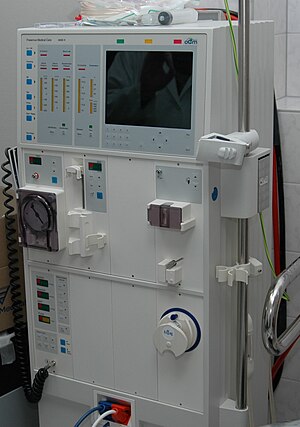Kidney problems
| Kidney failure | |
|---|---|
 |
|
| A hemodialysis machine, used to replace the function of the kidneys in renal failure | |
| Classification and external resources | |
| Specialty | Nephrology |
| ICD-10 | N17-N19 |
| ICD-9-CM | 584-585 |
| DiseasesDB | 26060 |
| MeSH | C12.777.419.780.500 |
Kidney failure, also known as renal failure or renal insufficiency, is a medical condition of impaired kidney function in which the kidneys fail to adequately filter metabolic wastes from the blood. The two main forms are acute kidney injury, which is often reversible with adequate treatment, and chronic kidney disease, which is often not reversible. In both cases, there is usually an underlying cause.
Kidney failure is mainly determined by a decrease in glomerular filtration rate, which is the rate at which blood is filtered in the glomeruli of the kidney. The condition is detected by a decrease in or absence of urine production or determination of waste products (creatinine or urea) in the blood. Depending on the cause, hematuria (blood loss in the urine) and proteinuria (protein loss in the urine) may be noted.
In kidney failure, there may be problems with increased fluid in the body (leading to swelling), increased acid levels, raised levels of potassium, decreased levels of calcium, increased levels of phosphate, and in later stages anemia. Bone health may also be affected. Long-term kidney problems are associated with an increased risk of cardiovascular disease.
Kidney failure can be divided into two categories: acute kidney injury or chronic kidney disease. The type of renal failure is differentiated by the trend in the serum creatinine; other factors that may help differentiate acute kidney injury from chronic kidney disease include anemia and the kidney size on sonography as chronic kidney disease generally leads to anemia and small kidney size.
...
Wikipedia
